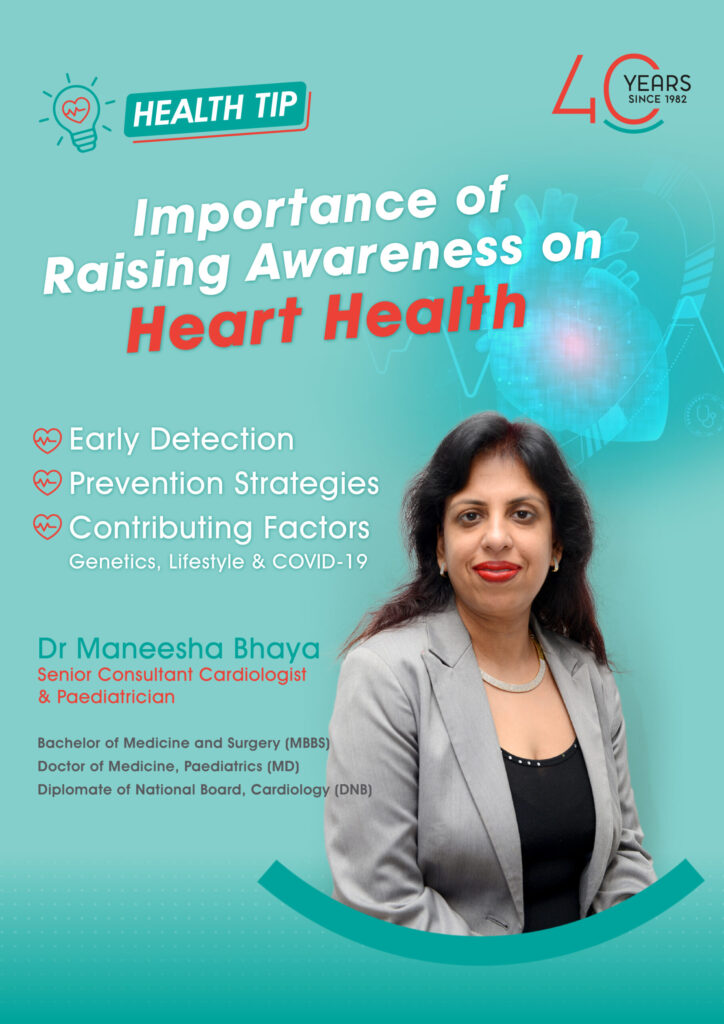
- September 5, 2023
1. Significance of World Heart Day in raising heart health awareness
“World Heart Day” has been observed in September since the year 2000 under the aegis of the World Heart federation. It is a global, multilingual event with an aim to inspire and galvanize action for heart healthy lifestyle amongst individuals. The international community organizes sports events, shows, concerts and podcasts, amongst others for the public highlighting the importance of preventing and treating cardiovascular diseases (CVD) at the earliest.
2. Recently we have noticed a surge of cardiac problems in young people. What are the contributing factors to these trends?
The Global Burden of Disease (GBD) study published in 2019 confirmed increased mortality due to cardiovascular diseases among individuals aged 15-29 years in the period ranging from 1990 to 2019. This increase was most noticeable in low- & middle-income countries. The study also identified the three most important factors: high systolic blood pressure, increased low-density lipoprotein cholesterol, and high body mass index. Environmental pollution was also implicated in low-income countries.
3. Importance of early detection and prevention strategies for heart problems.
“Prevention is better than cure” is especially true for CVD. Healthy lifestyle habits like regular exercise, eating plenty of green vegetables, avoiding sugar, low salt diet, sleeping well, abstinence from alcohol & smoking need to be instilled right from childhood. Regular measurement of blood pressure, blood sugar, cholesterol and body weight are essential starting from adolescence onwards. We can prevent most of the catastrophic consequences of CVD if we act on time.
4. What is the link between lifestyle (diet, exercise, stress) and heart health? What are the risks and consequences of a sedentary lifestyle?
A landmark international study known as the Interheart study, clearly established 9 major risk factors for heart attacks in all age groups irrespective of race and sex, namely:
· Diabetes
· High Blood Pressure
· High Cholesterol
· Obesity
· Sedentary Lifestyle
· Lack of sufficient fruit and vegetable intake
· Regular cigarette and alcohol consumption
· Chronic stress
· Genetics
As you will see, most of the aforementioned factors are related to lifestyle. Regular physical activity is an essential component of a healthy lifestyle.
5. How does genetics affect heart health? Advice for those with a family history of heart disease
Some types of heart diseases have a strong genetic basis and tend to run in the tfamily. This is especially true if heart attack or sudden cardiac death occurs in the first degree relative before the age of 55 years. If you have such a family history, it is imperative that you get yourself and even your children screened for heart diseases by a cardiologist at the earliest. The tests needed will depend on the initial evaluation by your doctor. At the same time, you need to be extra cautious regarding your lifestyle. Always remember, families not only share genes, they share lifestyles also.
6. What’s the impact of COVID-19 on heart health? Any important post-pandemic factors to be mindful of?
COVID-19 pandemic increased the CVD burden in many ways. Firstly, during the pandemic, CVD detection & treatment was delayed owing to frequent lockdowns & overburdened the healthcare services worldwide. Secondly, the SARS-COV 19 virus also directly caused inflammation of cardiac muscle and increased the risk of clot formation in arteries thereby increasing the risk of heart attack, strokes, and heart failure. At times, these manifestations occur long after the COVID-19 infection and are a part of long-COVID. Thirdly, pandemic has increased the psychosocial stress of many individuals.
In this scenario, the most important counsel is to remain extra vigilant regarding our lifestyle, keeping our CVD risk factors like diabetes, hypertension, high cholesterol levels well within control and contacting a doctor at the earliest if we are unwell.
7. Can you highlight recent advancements in cardiac treatment, diagnostics, and research?
Digital technology has revolutionized all aspects of cardiovascular healthcare. We have wearable devices and smart phone apps which can continuously record our blood pressure, pulse, blood sugar, electrocardiogram and share the data with healthcare providers anywhere in the world.
We can get an expert opinion within seconds via telemedicine. Many modern interventions and drugs have improved the treatment of heart attack, heart failure, diabetes, hypertension.
New treatments are being continually developed and soon we will be getting the latest generation of cholesterol lowering medications and anti-diabetes and anti-obesity medications in Mauritius as well. I would like to conclude on an optimistic note that with a healthy lifestyle and appropriate treatment, we can prevent most of the untimely deaths and suffering linked to cardiovascular diseases.
About the author:
Dr M. Bhaya, is a board-certified cardiologist from the National board of examinations (NBE), New Delhi, India. She is a fellow of the European society of cardiology. She provides consultations At Nouvelle Clinique Du Bon Pasteur and at her cabinet in Port Louis. She is a visiting consultant at Clinique Darne & C-Care Welkin Hospital.